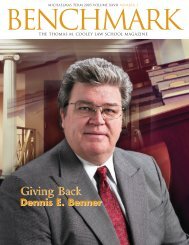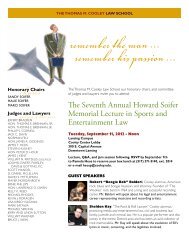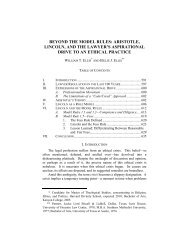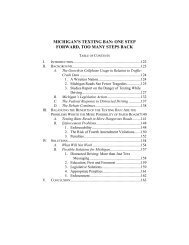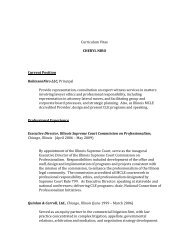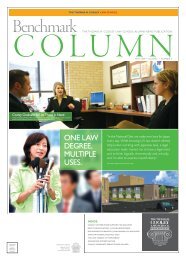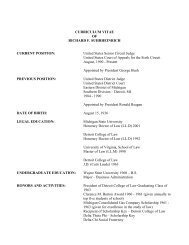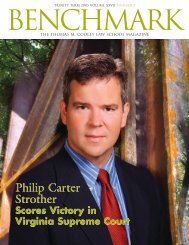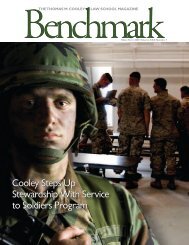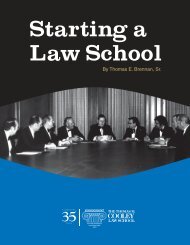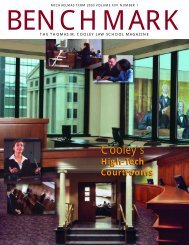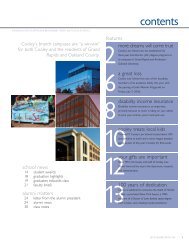Michigan Judges Guide to the Servicemembers Civil Relief Act
Michigan Judges Guide to the Servicemembers Civil Relief Act
Michigan Judges Guide to the Servicemembers Civil Relief Act
Create successful ePaper yourself
Turn your PDF publications into a flip-book with our unique Google optimized e-Paper software.
APPENDIX B - JUDGES’ CHECKLISTS<br />
Default Judgments Under <strong>the</strong> SCRA (50 USC App § 521)<br />
Defendant has not made an appearance.<br />
Plaintiff filed affidavit (with supporting facts) denying Defendant’s military service, or<br />
stating that Plaintiff is unable <strong>to</strong> determine if Defendant is in military service.<br />
∗<br />
Note: <strong>Michigan</strong> SCAO Approved Forms MC 07 and MC 07a (for Default Judgment<br />
Requests) include such affidavits.<br />
If Plaintiff is unable <strong>to</strong> determine whe<strong>the</strong>r Defendant is in military service, or states that<br />
Defendant is not in military service, <strong>the</strong> court may request a military service certification<br />
from <strong>the</strong> U.S. Department of Defense <strong>to</strong> confirm.<br />
∗<br />
Note: If <strong>the</strong> court cannot determine whe<strong>the</strong>r Defendant is in military service, it may<br />
require Plaintiff <strong>to</strong> post a bond <strong>to</strong> indemnify Defendant against loss or damage due <strong>to</strong><br />
<strong>the</strong> judgment (if <strong>the</strong> judgment is later set aside).<br />
If Defendant indeed is not in military service, <strong>the</strong> court may proceed with default judgment.<br />
If Defendant is in military service (and has not entered an appearance) <strong>the</strong> court must appoint<br />
an at<strong>to</strong>rney <strong>to</strong> represent Defendant before entering judgment.<br />
∗<br />
Note: If appointed at<strong>to</strong>rney cannot locate a Defendant servicemember, <strong>the</strong> at<strong>to</strong>rney’s<br />
actions will not waive any defense or bind <strong>the</strong> servicemember in any way.<br />
If a defense for <strong>the</strong> servicemember cannot be presented without his/her presence, or <strong>the</strong><br />
court-appointed at<strong>to</strong>rney cannot locate <strong>the</strong> servicemember, <strong>the</strong> court must enter a stay for at<br />
least 90 days when requested by <strong>the</strong> servicemember’s at<strong>to</strong>rney. The court may also do so on<br />
its own motion.<br />
Vacating and Reopening Default Judgments (50 USC App § 521)<br />
Default judgment entered during servicemember’s period of military service, or 60 days<br />
<strong>the</strong>reafter.<br />
Servicemember filed, within 90 days after <strong>the</strong> end of military service, an application with <strong>the</strong><br />
court or tribunal that issued <strong>the</strong> default judgment, specifically requesting <strong>to</strong> vacate and<br />
reopen <strong>the</strong> case.<br />
Servicemember establishes that, at <strong>the</strong> time judgment was entered, he/she:<br />
∗<br />
∗<br />
Was “materially affected” by military service in making a defense; and<br />
Has a meri<strong>to</strong>rious defense, in whole or in part.<br />
B-1



